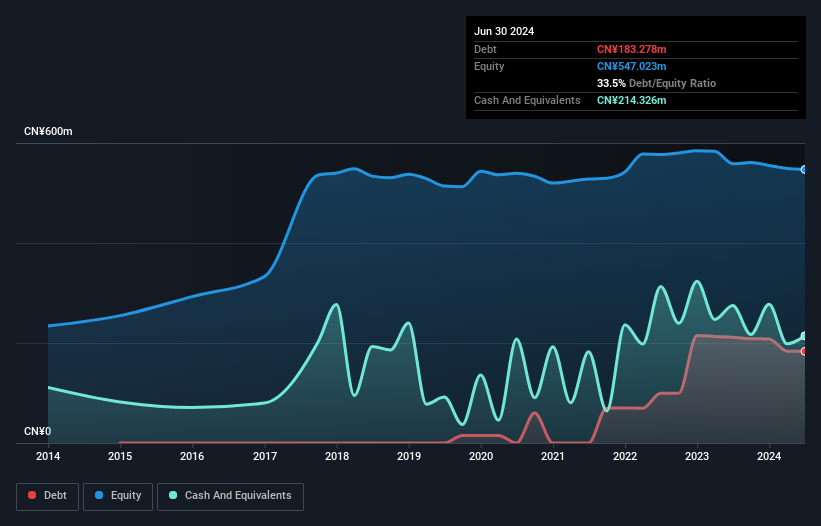- China
- /
- Entertainment
- /
- SHSE:603721
Health Check: How Prudently Does TVZone Media (SHSE:603721) Use Debt?
David Iben put it well when he said, 'Volatility is not a risk we care about. What we care about is avoiding the permanent loss of capital.' So it seems the smart money knows that debt - which is usually involved in bankruptcies - is a very important factor, when you assess how risky a company is. We note that TVZone Media Co., Ltd. (SHSE:603721) does have debt on its balance sheet. But the more important question is: how much risk is that debt creating?
When Is Debt A Problem?
Generally speaking, debt only becomes a real problem when a company can't easily pay it off, either by raising capital or with its own cash flow. Part and parcel of capitalism is the process of 'creative destruction' where failed businesses are mercilessly liquidated by their bankers. However, a more usual (but still expensive) situation is where a company must dilute shareholders at a cheap share price simply to get debt under control. Of course, plenty of companies use debt to fund growth, without any negative consequences. The first step when considering a company's debt levels is to consider its cash and debt together.
View our latest analysis for TVZone Media
What Is TVZone Media's Net Debt?
As you can see below, TVZone Media had CN¥183.3m of debt at June 2024, down from CN¥211.5m a year prior. But on the other hand it also has CN¥214.3m in cash, leading to a CN¥31.0m net cash position.

A Look At TVZone Media's Liabilities
According to the last reported balance sheet, TVZone Media had liabilities of CN¥102.2m due within 12 months, and liabilities of CN¥192.6m due beyond 12 months. Offsetting this, it had CN¥214.3m in cash and CN¥134.6m in receivables that were due within 12 months. So it actually has CN¥54.1m more liquid assets than total liabilities.
Having regard to TVZone Media's size, it seems that its liquid assets are well balanced with its total liabilities. So while it's hard to imagine that the CN¥3.97b company is struggling for cash, we still think it's worth monitoring its balance sheet. Simply put, the fact that TVZone Media has more cash than debt is arguably a good indication that it can manage its debt safely. There's no doubt that we learn most about debt from the balance sheet. But you can't view debt in total isolation; since TVZone Media will need earnings to service that debt. So if you're keen to discover more about its earnings, it might be worth checking out this graph of its long term earnings trend.
Over 12 months, TVZone Media reported revenue of CN¥263m, which is a gain of 18%, although it did not report any earnings before interest and tax. We usually like to see faster growth from unprofitable companies, but each to their own.
So How Risky Is TVZone Media?
We have no doubt that loss making companies are, in general, riskier than profitable ones. And in the last year TVZone Media had an earnings before interest and tax (EBIT) loss, truth be told. Indeed, in that time it burnt through CN¥688k of cash and made a loss of CN¥10m. With only CN¥31.0m on the balance sheet, it would appear that its going to need to raise capital again soon. Overall, its balance sheet doesn't seem overly risky, at the moment, but we're always cautious until we see the positive free cash flow. The balance sheet is clearly the area to focus on when you are analysing debt. However, not all investment risk resides within the balance sheet - far from it. For instance, we've identified 1 warning sign for TVZone Media that you should be aware of.
When all is said and done, sometimes its easier to focus on companies that don't even need debt. Readers can access a list of growth stocks with zero net debt 100% free, right now.
Valuation is complex, but we're here to simplify it.
Discover if TVZone Media might be undervalued or overvalued with our detailed analysis, featuring fair value estimates, potential risks, dividends, insider trades, and its financial condition.
Access Free AnalysisHave feedback on this article? Concerned about the content? Get in touch with us directly. Alternatively, email editorial-team (at) simplywallst.com.
This article by Simply Wall St is general in nature. We provide commentary based on historical data and analyst forecasts only using an unbiased methodology and our articles are not intended to be financial advice. It does not constitute a recommendation to buy or sell any stock, and does not take account of your objectives, or your financial situation. We aim to bring you long-term focused analysis driven by fundamental data. Note that our analysis may not factor in the latest price-sensitive company announcements or qualitative material. Simply Wall St has no position in any stocks mentioned.
About SHSE:603721
TVZone Media
Produces, distributes, and markets video content for television, Internet, and mobile Internet, TV series, broadcasting operation, and film television drama in China.
Mediocre balance sheet with minimal risk.
Similar Companies
Market Insights
Community Narratives



